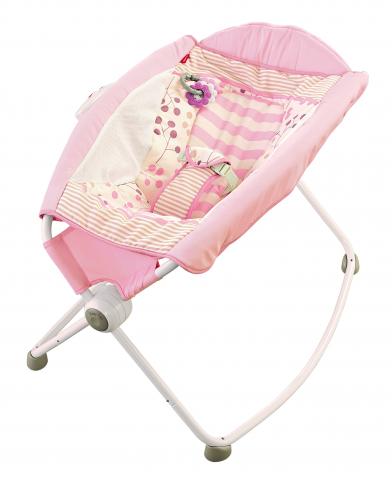Rock ’n Play, Rocking Sleeper Unsafe? Sleepers Recalled as Debate Continues

Graphic Courtesy of Consumer Product Safety Commission
The headline in The Washington Post said it all: “Fisher-Price invented a popular baby sleeper without medical safety tests and kept selling it, even as babies died.”
Not a stitch of clinical research was conducted, nor was the advice of a single pediatrician sought for the Rock ’n Play Sleeper, which debuted in 2009. Instead, Fisher-Price consulted a family doctor from Texas who since has lost his license. Wow.
“That’s shocking,” Nancy Cowles, of Kids in Danger, told the newspaper. “It would never cross anyone’s mind that it wasn’t tested for safety.”
The inclined cradle that buzzes and vibrates and is billed to put babies to sleep fast and easy has resulted in 50 deaths from suffocation. The product – all 4.7 million – has been recalled by Fisher-Price as has a similar product – the Rocking Sleeper – made by Kids II. That recall, prompted by five deaths, numbered 700,000. Fisher-Price also has recalled 71,000 Ultra-Lite Day & Night Play Yard sleepers, which fortunately have not been linked to any deaths.
“The Consumer Product Safety Commission (CPSC), which helped coordinate the recall, said more than 30 babies died in the product after they turned over while unrestrained…,” The Washington Post article states, referring to the Rock ’n Play. “But regulators did not definitively blame the product for the deaths. The recall followed a report by Consumer Reports magazine days earlier that was the first to document concerns about the product’s development and pushed for the recall after it obtained agency records about the deaths.”
The death toll has risen by 20 and could continue creep upward.
“Recalls are notoriously ineffective at removing products from the market, and fatality reports have come into the CPSC since the April 12 recall, according to a senior agency official,” The Washington Post article states.
What is most perplexing about the crisis is that the Rock ’n Play and the Rocking Sleeper conflict with a tried-and-true guideline established by the American Academy of Pediatrics on infant sleep safety. The guideline calls for babies to be put down in empty cribs on their backs.
“There was no reason for this thing to be out there,” Benjamin Hoffman, of the American Academy of Pediatrics, said of the Rock ’n Play. “It never should’ve been.”
The American Academy of Pediatrics initiated a “Back-to-Sleep” Campaign in 1994 in collaboration with the Maternal and Child Health Bureau of the Health Resources and Services Administration, the National Institute of Child Health and Development and several SIDS (Sudden Infant Death Syndrome) groups.
“A diagnosis of SIDS is given when no explanation can found for the baby’s death after a complete postmortem investigation,” according to the “Back-to-Sleep” Campaign’s Web page. “SIDS is the leading cause of death for infants between 1 month and 1 year of age. In 1993 alone, nearly 4,700 U.S. infants died from SIDS.
The campaign’s focus is to advocate to parents the importance of properly putting their prides and joys to bed. Its goal is to reduce the occurrence of SIDS.
“Research showed that between 1993 and 2010 the percent of infants placed to sleep on their backs increased from 17% to 73%,” according to the Web page, which notes that “the number of infants dying from SIDS has decreased to 2,000 per year, from 4,700.
Besides the 50 deaths linked to the recalled sleepers, six more have been linked to the Nap Nanny. Despite the daunting data, several other sleepers by Baby Delight, Evenflo and Hiccapop remain on the market as the CPSC seemingly turns a blind eye.
“The CPSC has left the future of inclined sleepers to ASTM International, an organization that brings manufacturers, government officials, medical experts, consumers, and others together to establish voluntary industry standards for thousands of products and processes,” states a Consumer Reports (CR) article titled “Inclined Sleeper Deaths Rise to 50 as Industry Continues to Sell the Products.” “But in May, the ASTM infant inclined sleep products subcommittee decided – against objections from CR and some other members – that rather than pulling the category from the market, it would simply investigate the product’s standard and potential hazards further and reconvene in October 2019.”
Don Huber, the magazine’s director of product safety and a member of several ASTM International panels, was outraged.
“It was unbelievable to be in that meeting and hear that the industry needs more data to eliminate the category,” Huber was quoted as saying in the article. “Why is there a greater burden to provide data to remove a hazard than to introduce one?”
Share This


